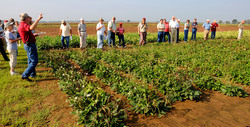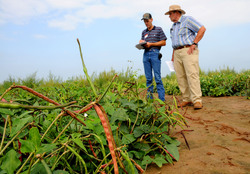Alma, Arkansas
August 25, 2008
 |
|
Visitors tour
southern pea research plots during a field
day Aug 22 at the University of Arkansas
System Division of Agricultureís Vegetable
Research Station near Kibler. |
|
 |
|
Jim Moore of
Thackerville, Oklahoma, left, and vegetable
breeder Teddy Morelock look at a test plot
of Early Scarlet peas. Pea growers,
processors and seed dealers learned about
the southern pea program at the University
of Arkansas Systemís Division of Agriculture
during a field day Aug. 22 at the divisionís
Vegetable Research Station near Kibler. |
|
Scientists at the
University of Arkansas
System's Division of Agriculture are working toward developing
southern pea varieties with herbicide tolerance that could bring
a new weapon to the battle to control weeds.
Graduate student Vinod Shivrain told visitors to a field day
Aug. 22 at the Division's Vegetable Research Station near Kibler
that weed scientist Nilda Burgos is working with vegetable
breeder Teddy Morelock to select breeding lines for tolerance to
several commercial herbicides.
In test plots, Shivrain said, various breeding lines are sprayed
with herbicides. Then seed is selected from the plants that
survive. Those seeds are planted the following year and the
process is repeated. Similar work is being done for spinach and
other vegetable crops, Shivrain said.
Morelock said building herbicide tolerance in southern peas is
an exciting move for the breeding program. Since the program
began about 60 years ago, he said, breeders have developed
improved varieties for both commercial processors and home
gardens.
"One of the things we worked to accomplish," Morelock said, "was
to get the pods on top of the plant, where they would be easier
to harvest, rather than on runners on the ground."
Morelock said there are about 7,500 breeding lines in the
program, a massive number to keep track of. The latest varieties
to be released, in 2008, are Ebony, a black pea with a white
eye, and Envoy, a red "Holstein" with a reddish brown and tan
mottling.
"These are both good eating peas," Morelock said. "Envoy had the
top yields in trials for three years in a row, so it's a novelty
variety with high yields."
In another presentation, division entomologist Paul McLeod told
the pea growers, processors and seed dealers in attendance that
entomologists love working with southern peas.
"Insects love southern peas," McLeod said. "They go after them
from planting right through storage."
The main culprits, he said, are thrips and aphids. But treating
pea fields against insect pests can be expensive for a crop with
a narrow profit margin.
"We've been looking at seed treatments as a means of lowering
costs," McLeod said. "Seed treatments are relatively cheap to
put on and the good news is that it looks like it's working."
So far, tests have shown seed treatments can give good control
for both thrips and aphids, McLeod said. |
|